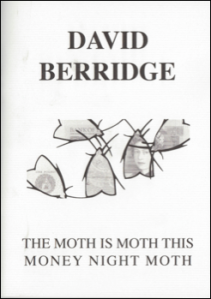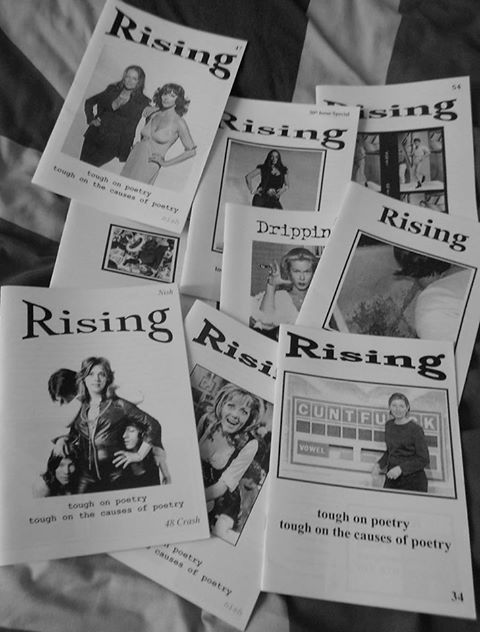‘THE MOTH IS MOTH THIS MONEY NIGHT MOTH’ by David Berridge
-Reviewed by Rosie Breese–
It’s awesome being a reviewer, because now and again, a jiffy bag comes through the letterbox containing something completely, wonderfully different. That’s exactly what happened when David Berridge’s superb collection THE MOTH IS MOTH THIS MONEY NIGHT MOTH plopped onto my doormat. A gorgeously put-together pamphlet from the Knives Forks and Spoons Press, it contains a series of poems – or word-equations – which shimmer and morph in the mind as they do on the page.
Words are dangerous things to work with. Their meanings shift. For example, the word different comes with a whole host of awkward connotations. Different can mean difficult; it can mean weird; it can mean uncategorisable. It could be construed as a lazy definition on my part; an attempt to distance myself from something I haven’t really ‘got’.
I’ll make a confession. I don’t ‘get’ this pamphlet. But I’ll make the case that ‘getting’ it might not be the be-all and end-all of this collection. Rather, it’s a space to be inhabited by both reader and writer, its meanings under constant exploration and review. Maybe this could be said of any collection of poetry, but it is especially apparent here, where there is so little conventional signposting for the reader.
The joy and beauty of these poems is that they don’t dictate to the reader how they should be approached. There’s no recourse to convention (except, perhaps, the emerging conventions of experimental poetry?), no rhyme, no metre, although there is a sense of internal cohesion, a progression of sound and meaning:
slake night
green snow
Here, there is a progression through the vowel sounds A/E/I/O (or A/I/E/O, depending on which way you choose to read it). The ‘U’ is missing – ‘you’ are perhaps lost or absorbed. There is a progression of ideas: ‘slake’ suggesting satisfaction, and conversely, thirst; ‘green’ and ‘snow’ forming what could be construed as a contrasting set of ideas – fertility and barrenness.
But that’s just one set of interpretations. Meaning, as Berridge’s wriggling word-strings suggest, is a mutable thing. The poems enact this through their constant movement, through the shifting of letters according to a logic imposed first by the writer, then by the reader:
feet fashion slake low mouth
t*o*n*
g*u*e*
___________
snow = star
There is a mutation, a sequence of interlocking sounds in the first line of this poem. There is a procession of ideas, each word trailing its subjective debris. The asterisks between the letters of ‘tongue’ could serve to defamiliarise, to question; equally, they could be the ‘stars’ referred to in the final statement ‘snow = star’. Then there is the sense of stars as snow on the tongue, of sensation inside and around the tongue; a glorious, unexpected physicality emanating from these isolated, decontextualised letterforms.
This tangibility was what really struck me when reading and re-reading this collection. There’s a vividness, a synaesthesia here. From the outset, the reader is plunged into a sensual world, with the body and environment in direct contact:
feet lake green lake mouth lake felt lake night night lake tongue lake
There is no direction as to how you should feel when reading this, what you should look at first, or take with you when you leave the page. This lack of overt direction brings with it a sense of immediacy, urgency even, which brings the reader into communion with the word itself and the whole sensual world inside the mind.
As for themes, maybe it’s just because it’s the Christmas shopping season, but for me, the repeated ideas of ‘money’ and ‘fashion’ suggested materialism, something which is reinforced through patterning of ‘mouth’, ‘tongue’, ‘belly’ and ‘slake’, all related to the act of consumption. There is the sense of a process throughout – the process of consumption, of mass-production of meanings, shifting and multiplying with each rearrangement and re-reading.
In this context, I found Berridge’s chosen ending devastating. A short sequence of three words with the initial consonants bracketed and brought into question. They can’t be read unless it is accepted that what you are reading here is a vast swathe of possible meanings:
(s)tar (g)leen (t)outh
The sequence ends with three simple and definite words, which in themselves open an abyss for further exploration – a sense of absence that persists:
money mouth night
This inconclusive conclusion is fitting. The whole sequence revolves around the evasion of grasp – of words, of meaning, of satiety. Intentionally or not, these poems make the case for art as context; for poetry as a negotiable space.
This is a beautiful piece of work which shifts and moves under the gaze like the living thing an artwork should be allowed to be. I don’t get it yet; I might never ‘get’ it, and I’m fine with that. But I am sure of two things about it: that I will come back to it again and again, and that every time I do, it will be different, in the best and most valuable sense of the word.




Pingback: David Berridge – Bring the Thing now available | IF P THEN Q